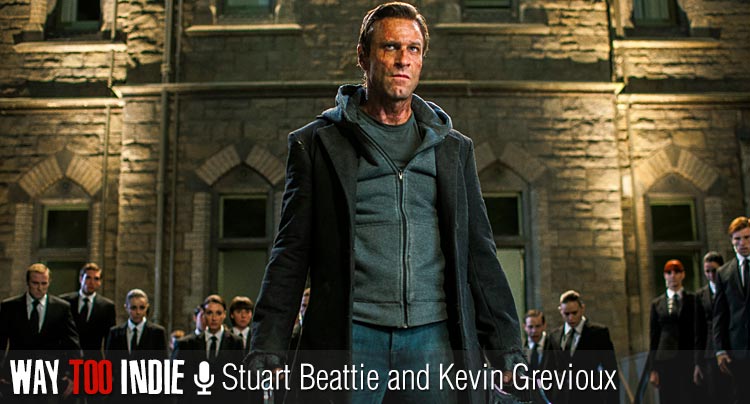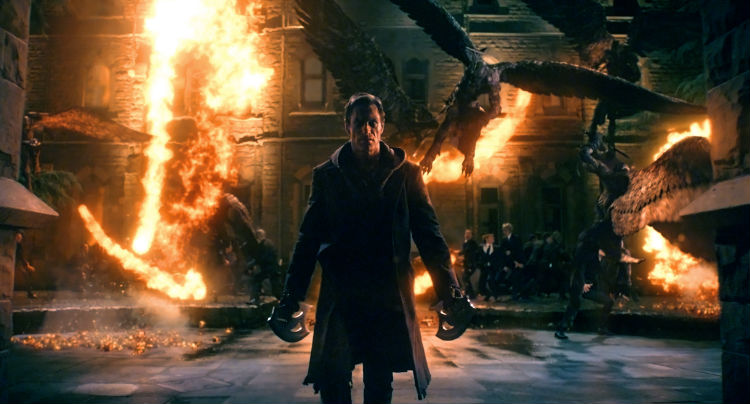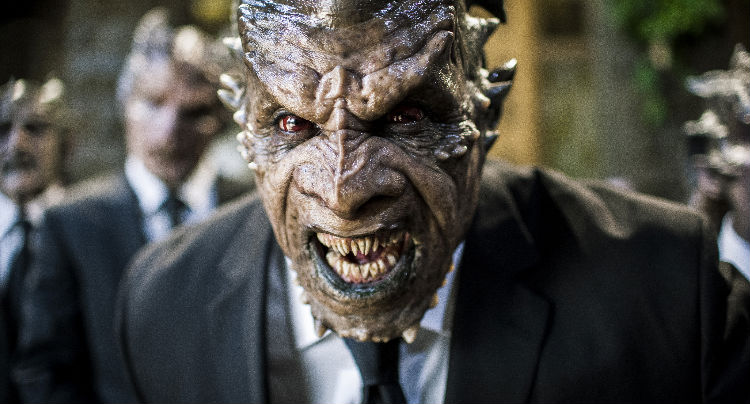Stuart Beattie and Kevin Grevioux Talk ‘I, Frankenstein’

In I, Frankenstein, director Stuart Beattie (Tomorrow, When the War Began) and screenwriter Kevin Grevioux (Underworld series) continue the story Mary Shelley started 200 years ago, as we find out what happens after the events of Shelley’s original version. Starring Aaron Eckhart as the soul-less monster, the film lets Frankenstein play in a genre we’ve never seen him in before: action.
Beattie is mostly known for his work as a screenwriter, having penned such blockbuster hits as the Pirates of the Caribbean series, Collateral, and G.I. Joe: The Rise of Cobra. Grevioux, who’s created the I, Frankenstein and Underworld franchises in both film and comic book form, also acts in both films.
Beattie and Grevioux talked to us in separate phone conversations about what has caused the Frankenstein character to endure for hundreds of years and what he means to them personally, what they’ve added to the mix for their modern interpretation, casting Aaron Eckhart, getting “clobbered” with sticks, and more. Below is our chat with Beattie, followed by our conversation with Grevioux.
I, Frankenstein opens nationwide this Thursday with 10pm screenings.
You’re film is a fresh, modern interpretation of Mary Shelley’s Frankenstein, but what do you think is at the core of her original creation that’s made him such an enduring character?
Stuart: It’s the fact that he’s alone and want someone to share his life with. He wants someone to love, someone to share his life with. It’s the one thing we all want, really. I think that’s what makes him such an engaging character that’s lasted hundreds of years. It’s a universal condition, to want to connect with someone. He represents that better than any other literary character, because he literally is the only one of his kind. There literally is no one else like him, that can understand what he’s going through. Your heart bleeds for him. You can relate. You can say, “Yep. I’ve felt like that.””
How do you personally relate to the character? Were you a fan growing up?
Stuart: I’ve felt alone, I’ve felt misunderstood. I’ve felt that I’ve got all this love to give and no one to give it to. All those things. Fortunately I don’t feel them anymore, but I can remember when I did! (laughs) I have a full life, but it’s something everyone goes through at some point in their lives, some more than most, you know?
I can relate to that, for sure. How important was it to retain that theme, that layer of Mary Shelley’s character, in your film?
Stuart: Oh, that was everything. I mean, everything. That’s why I took this film. You can’t call it Frankenstein if you try to change that. When they did try to change it, I would say, “Okay, but you can’t call it Frankenstein anymore,” and I would win those arguments. It’s the idea that you can make an action film with a really complex, rich, relatable character at the center of it. You don’t often get the opportunity to do that. Character is always the first thing to get sacrificed in an action movie. Here, I felt like the film had a good chance of staying with this great character. That’s how we got Aaron Eckhart, and that’s why people are responding to the film so positively. They really see that there’s this great, powerful human story in the middle of it all.

It’s always been a great character and a great story, but now you and Kevin Grevioux have thrown a few new things into the formula. You’ve put him in the action movie arena and retained the intelligence we saw in Shelley’s version, but has been a bit lost in more recent monster flicks.
Stuart: I was trying to figure out where he is at the end of Mary Shelley’s story. Basically, he’s a monster, right? He’s a corpse that’s been brought back to life, and he hasn’t got a soul, so he doesn’t have his humanity yet. That’s an interesting next chapter, showing how that monster earns his humanity, how he becomes a man. I though that was really compelling. To me, the best part about humanity is that self-sacrifice for a higher purpose. It’s all those people who give up the comforts of their lives to help others, to defend others, to protect others. That, to me, represents the best of mankind. We put the monster on this course where he’s going to have this choice of either getting what he wants, which is love, or giving up the love in order to protect mankind. Mankind has been nothing but horrible to him for his entire existence, starting with his father, of course. That, to me, is a really interesting place to take that character. That, in my eyes, would earn him a soul.
There are all of these complex layers to the character, which I’m sure led you to Mr. Eckhart. Do you remember ever seeing a particular performance from him where you thought he’d be perfect for this role?
Stuart: It’s going to sound weird, but Erin Brockovich. He was just amazing. In every performance he gives, he’s one-hundred-percent there, whatever it is. That was it, more than anything else: knowing that that was his work ethic. I needed someone who could completely commit to this character. Everyone has their own preconceived notions [about the character, but I needed] someone who could write their own notion and make you believe that it was him on screen. It’s a short list, but fortunately, Aaron was available and responded to the script. Throughout the shoot he was amazing in his dedication to the character. He was so prepared. We had nine weeks and 36 million dollars. It wasn’t a lot to make this kind of movie, and without someone like Aaron leading the way and showing us how it’s done, we would have never gotten through it.
In terms of action, the movie looks pretty spectacular. Can you describe your style of shooting action? Also, what’s Frankenstein’s fighting style?
Stuart: (laughs) The first thing is, I hate those action movies which have sequences with a bunch of close-ups. Cut, cut, cut, cut, cut. It drives me nuts. I lose all sense of geography, and it’s just infuriating. For me, right from the start, I said let’s pull the camera back, shoot the actors head to toe, put the camera on the ground, and let the actors do their fights. That was the style that I wanted to shoot the movie in, and I made everyone very aware of it. (laughs) We went through six months of training to get the actors and stuntmen to a place where they could do these fights realistically and really be trying to kill each other. That’s the only way to really sell it, but to do it in a way where everyone is safe took a lot of work. From the get-go, I said the camera was going to be back low and wide, and people are going to see these fights. To me, that’s half the fun of seeing this movie. It’s really Aaron Eckhart swinging those sticks around, you know? If he misses or if he misses the block, he’s getting clobbered, and it’s nasty. I got clobbered with one of those sticks, and it’s not fun!
That was one part of it, but another part was to say, “No car chases. No shootouts. Just fights.” Those things have been done in action movies to death, and to try and find different kinds of action…(pauses) that’s where Kali stick fighting came in. It’s this wonderful martial art that’s incredibly cinematic, and it had never really been done in a Hollywood film since Rambo, which is where I first saw it. I wanted to shoot it in a way where you could see it.
What was your research process like? Did you pull from the Hammer films?
Stuart: Oh, yes. I looked at every Frankenstein film ever made. Every mini-series, everything. I watched them all. There are some good ones, there are some bad ones, there are some great ones, but they’re all the same kind of story. In my mind, doing something completely different and telling the next chapter was the right thing to do. The Mary Shelley story has been told so many times, and it doesn’t need telling again.
Why is now the perfect time to put out another iteration of it? We haven’t seen one in 20 years.
Stuart: I think because we haven’t seen one in 20 years! (laughs)
Touché!
Stuart: (laughs) Look, it’s fresh. It’s different. There’s a whole generation of kids who know what Frankenstein is, but have never seen a Frankenstein movie. That’s terrible, and we need to change that. This is a different kind of Frankenstein, and it feels like the right time to reinvent him. The Danny Boyle play is out there, which you can see too, and it’s a story that will always be told.
[Following our phone conversation with Mr. Beattie, we switched over to Kevin Grevioux]
I asked Stuart this: What is it about the Frankenstein character, at its core, that’s made it endure for 200 years?
Kevin: I think it’s a combination of things. I think at his core, Frankenstein is us. It’s something we can identify with. None of us asked to be brought into the world. Whereas we’re taught right from wrong from our parents, he was not. He actually holds Victor Frankenstein’s feet to the fire when he says, “I’ve read the bible. I saw that God never abandoned Adam. He gave him his moral compass. But you. You abandoned me and left me to my own devices. So, what I am is because of you.” I think that people understand that tragedy, because nowadays, we see what happens to abandoned children. We see them act out. I think that’s something we can identify with.
It’s also a story of perception. Here he is, chased and hated by villagers, just by virtue of the fact he exists. He can’t help what he is. That kind of buys into the idea of, are we who people perceive us to be, or are we who perceive ourselves to be? I think that’s why the concept has endured for so many years. He’s misunderstood.

That’s been at the core of the character from the beginning, but now you’ve created this new world for him to inhabit. Talk about the world-building process for this franchise.
Kevin: I remember thinking after Underworld, I was going to handle things differently. I lost control of that franchise. For this one, I wanted to create it from the ground up. I promised myself I would never write another naked screenplay again. I remember when Lakeshore heard about the script, I wanted to make sure they understood exactly what it was I was creating. What I did after I finished the screenplay was create some graphic novel pages. It was unfinished at the time, but I wanted to make sure they got it. When I handed the screenplay to them along with the pages, they immediately understood what I was trying to do, when before they didn’t. Because of that, I had the basis on which to build and expand this universe even beyond what the movie can do. You know, you’re working with budgets when you’re doing films. With comic books, you have a chance to really build the world out and have a mythology we’ve not seen before.
What’s interesting to me about this is, over the past decade, what you see is comic books being adapted to film. Here, you’ve got the film–you wrote the screenplay first–and you’re using the graphic novel as almost a proof of concept that the franchise can survive the market.
Kevin: Exactly. That’s what you do. I think as a creator you need to do whatever you can to make sure you get your stuff out there and it works. One of the most horrific things I’ve experienced as a writer is when you’ve written a screenplay you think is good–and it may be–but if no one bites, it dies. That’s no good. What you have to do is take your screenplay and adapt it. That’s what Steven Niles did. A lot of people don’t know that. He tried to sell 30 Days of Night as a movie first, and it didn’t work. What did he do? He turned it into a graphic novel, and they bought his screenplay after that! To me, that’s brilliant. That’s what you do.
I want to talk comics for a bit. You operate in that world as well, writing comics for Marvel and IDW. I love comic books. What can you say to people who aren’t into them what comic books can do that films can’t. Why should they check them out?
Kevin: I think that comic books are more pure. I think they represent the purity of the creator’s idea. That’s why I think people should always read them. With movies, you’re going to be limited to other people’s visions and understanding of your work. Comic books are you, unadulterated. I think that’s what people should understand. Plus, just from a budgetary standpoint, you can do anything in comics. With movies…man. (laughs) You need millions of dollars, like with I, Frankenstein. I can write the screenplay, and I can make the graphic novel, but making a movie? I’m a couple of bucks short.
The cool thing about your situation is, there are a lot of screenwriters out there, making fantastical worlds like the one you’ve made for this film, but you’re one of the very few who get to be in the movie and step into the world you’ve created. That must feel incredible.
Kevin: It’s fun. I realized a long time ago that, if you want a career, you’re going to have to make your own career. You have to create your own work. I see actors asking people for jobs, auditioning endlessly. Create your own! Look at what Sylvester Stallone did. Personally, I think he’s one of the great cinematic heroes of the last era. He said, look: I want to be an actor, but I’m going to write my own vehicles and put myself in them. They worked like a charm. Spike Lee and Quentin Tarantino have done the same thing. When you’re on set and you look at your creation come to life…that’s a great feeling.
That’s in line with what you mentioned earlier, that purity of vision.
Kevin: Exactly.
You’ve put Frankenstein in the action genre, one that he’s never inhabited before. How versatile do you think he is? Do you think the character could work in other genres?
Kevin: You know what..I think so. It depends upon the approach you take. I think almost any character can be adapted. Look at what they did with Abraham Lincoln! That was cool. I half rolled my eyes when I first heard of that concept. I thought, if some studio bought it, it could probably work. Sure enough, I bought the DVD, and that bad boy was good! (laughs)
What does Frankenstein mean to you personally?
Kevin: I’m going to be a little simplistic here. I could give you an existential answer. The more fun answer is: Dude. To me, seeing House of Frankenstein where you have this three-way conflict between Dracula, the Wolf Man, and Frankenstein…there you go. You know what I’m saying? There you go. What happens if you expand that? Underworld did the same thing. What if you remove Frankenstein, and we have a race of vampires against a race of werewolves? It’s cool! I think, really, it’s as simple as that when it comes to creators. I think it’s fun. I’m one of those individuals who’s ecstatic that we have Marvel Studios now, bringing these characters to life, characters I loved as a kid. I remember being in Walmart last year, and I saw a kiosk with a picture of The Hulk, Thor, Iron Man, and Captain America. I remember saying to myself, man…I don’t believe they’ve made a movie of the Avengers…and it doesn’t suck! I cannot believe that! I never thought that day would come. I’m an old man. I remember that Spiderman TV series. (laughs)
